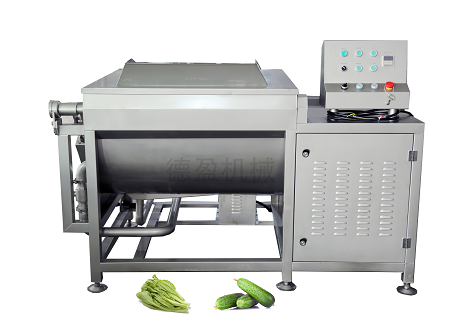Name: Single-tank Cleaning Machine DY-FD-1

Purpose: For cleaning materials such as leafy vegetables, root vegetables, and ribs that are cut into sections, slices, or pieces, including cabbage, celery, spinach, carrots, winter melon, potatoes, etc.
characteristic:
The cleaning time can be adjusted by yourself;
Automatic material feeding;
The cleaned materials will be automatically drained before being poured;
Water can be recycled;
It has a filtering effect.
Technical parameters:
Leafy vegetables: 12-16kg/3-15 minutes
Roots and stems: 16-50kg/3-5 minutes
Output: 400-500kg/h
Capacity: 170L
Power: 3kw
Overall dimensions: 1760*1200*1223mm
The Vegetable Washing and Drying Machine is an advanced industrial solution designed to streamline post-harvest processing with high efficiency and hygiene. Below are 4-6 key features with technical specifications:
Equipped with a multi-stage washing mechanism, the machine processes 500–1,000 kg/hour of vegetables, depending on model variants. The stainless-steel drum rotates at 15–25 RPM, ensuring thorough cleaning without bruising produce. Integrated water jets operate at 2–3 bar pressure, removing 98% of surface contaminants (tested per ISO 22000 standards).
Post-wash drying utilizes a patented vortex airflow system with 1.5 kW centrifugal blowers, achieving moisture reduction to<5% residual="" water="" content="" in="">90–120 seconds. The adjustable airspeed ranges from 8–12 m/s, accommodating delicate leafy greens to root vegetables.
An optional ozone generator delivers 0.5–2 ppm concentration during washing, achieving 99.9% microbial reduction (validated by third-party labs). This meets FDA CFR 21 and EU EC 852/2004 food safety requirements without chemical residues.
The industrial-grade VFD allows precise adjustment of wash/dry cycles from 30–300 seconds, with motor power consumption optimized to 3–7.5 kW. Real-time monitoring via a 7-inch HMI touchscreen provides data logging for HACCP compliance.
An automatic 50-micron debris filtration system with stainless steel mesh captures particulate matter, reducing water consumption by 40% through closed-loop recycling. The backflush cycle activates every 15 minutes at 4 bar pressure.
Constructed with 304-grade stainless steel, the machine features a 45° inclined conveyor for gentle product transfer and IP65-rated components for wet environments. Dimensional flexibility accommodates 1.2–2.4m conveyor widths for production line integration.
These engineering advancements position the machine as a cost-effective solution for commercial farms and food processors, reducing labor by 70% while improving compliance with global food safety protocols.
1. Commercial Food Processing Industry
Vegetable washing and drying machines are essential in large-scale food processing plants. They ensure efficient cleaning of bulk vegetables like potatoes, carrots, and leafy greens, removing dirt, pesticides, and contaminants. The drying feature reduces moisture, extending shelf life and meeting hygiene standards for packaged or frozen products.
2. Restaurant & Catering Services
High-volume kitchens rely on these machines to save time and labor. They quickly wash and dry vegetables, herbs, and salad ingredients, maintaining consistency in food prep. The automation minimizes cross-contamination risks, ensuring compliance with food safety regulations in hotels, cafeterias, and event catering.
3. Organic Farming & Agri-Businesses
Organic producers use gentle washing systems to clean delicate produce (e.g., berries, spinach) without damaging them. The drying function prevents mold growth post-harvest, preserving nutrient quality. This technology supports farm-to-table businesses by streamlining post-harvest handling.
4. Ready-to-Eat Meal Production
Pre-cut vegetable suppliers and meal-kit companies depend on these machines for rapid processing. They remove residual soil and bacteria from pre-packaged veggies, ensuring crispness and reducing spoilage. The automated process aligns with HACCP protocols for fresh-cut produce.
5. Supermarket & Retail Chains
In-store salad bars and fresh produce sections use compact models to clean vegetables daily. The machines enhance visual appeal by eliminating surface water, reducing wilting. Retailers benefit from longer display freshness and reduced waste.
6. Food Export & Packaging Facilities
Export-grade vegetables require thorough cleaning to pass international phytosanitary checks. These machines provide controlled drying to optimal moisture levels, preventing microbial growth during transit. They're critical for meeting export documentation requirements like USDA or EU standards.